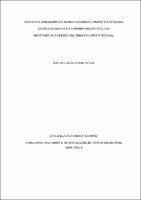Use este identificador para citar ou linkar para este item:
https://repositorio.idp.edu.br//handle/123456789/3648| Título: | A felicidade do maior número: o discurso utilitarista na modulação de efeitos em matéria tributária |
| Autor(es): | Farias, Maria Clara Cunha |
| Orientador(es): | Branco, Paulo Gustavo Gonet |
| Palavras-chave: | Lei n.º 9.868/99;Controle judicial;Constitucionalidade;Supremo Tribunal Federal |
| Data de submissão: | 2021 |
| Citação: | FARIAS, Maria Clara Cunha. A felicidade do maior número: o discurso utilitarista na modulação de efeitos em matéria tributária. 2021. 140 f. Dissertação (Mestrado em Direito Constitucional) Instituto Brasileiro de Ensino, Desenvolvimento e Pesquisa, Brasília, 2022. |
| Resumo: | A Lei n.º 9.868/99, ao regulamentar o processo e julgamento da ação direta de
inconstitucionalidade e da ação declaratória de constitucionalidade perante o Supremo Tribunal
Federal, trouxe em seu texto uma técnica de decisão que transformou o controle judicial de
constitucionalidade das leis: a modulação de efeitos. O presente estudo teve como objetivo
avaliar a “segurança jurídica” e o “excepcional interesse social”, requisitos listados como
justificadores da manipulação temporal de efeitos da decisão declaratória de
inconstitucionalidade, na jurisprudência do Supremo Tribunal Federal que modula os efeitos de
decisões de declaração de inconstitucionalidade em matéria tributária. Mais especificamente,
buscou-se a relação da maneira como o Supremo Tribunal Federal define esses termos com a
filosofia utilitarista elaborada por Jeremy Bentham. Para tanto, foi realizada pesquisa
bibliográfica sobre a proposta de codificação do direito britânico apresentada por Bentham,
contrapondo-a à criação judicial do direito, bem como uma avaliação do estado da arte da
definição de “segurança jurídica” e “excepcional interesse social” na doutrina. Além disso,
demonstrou-se a fundamentação do Congresso Nacional para a incorporação da modulação de
efeitos no ordenamento jurídico brasileiro. Em um segundo momento, foram analisados
acórdão prolatados pelo Plenário do STF em que se atingiu o quórum para a aplicação da
modulação de efeitos em controle concentrado de constitucionalidade referente a normas
tributárias. Constatou-se que a Suprema Corte, embora preserve a segurança jurídica ao
modular os efeitos de suas decisões, não tem priorizado os direitos individuais do contribuinte,
principalmente o direito à ação de repetição de indébito, o qual tem fundamento constitucional.
Com isso, a função protetiva dos direitos do cidadão em face do Poder Público – inerente à
jurisdição constitucional – encontra, nesse aspecto, ponto de inflexão. |
| Abstract: | Law 9.868/99, when regulating procedural aspects of direct actions of unconstitutionality and declaratory actions of constitutionality before the Federal Supreme Court, prescribes a decision technique that transformed judicial review in Brazil: the modulation of effects, or prospective overruling. The present study evaluates "legal certainty" and "exceptional social interest", requirements listed as justifiers of the manipulation of effects of the declaratory decision of unconstitutionality, in the case law of the Federal Supreme Court that modulates the effects of decisions of declaration of unconstitutionality in tax matters. More specifically, we examined how the way the Federal Supreme Court defines these terms relates to the utilitarian philosophy elaborated by Jeremy Bentham. To this end, bibliographical research was conducted on the proposal for codification of British law presented by Bentham, contrasting it with the judicial creation of law, as well as an evaluation of the state of the art of the definition of "legal certainty" and "exceptional social interest" in Brazilian legal doctrine. In addition, we analyzed the rationale of the National Congress that resulted in the incorporation of modulation of effects in the Brazilian legal system. Furthermore, this study analyzed the decisions handed down by the STF Plenary in which the quorum for the application of modulation of effects in concentrated control of constitutionality concerning tax norms was reached. It was found that the Supreme Court, although preserving legal certainty by modulating the effects of its decisions, has not preserved the individual rights of the taxpayer, especially the right to action for recovery of undue payment, which has constitutional basis. Thus, the protective function of the citizen's rights against the Public Power - inherent to the constitutional jurisdiction - finds, in this aspect, an obstacle. |
| URI: | https://repositorio.idp.edu.br//handle/123456789/3648 |
| Aparece nas coleções: | Mestrado Acadêmico em Direito Constitucional |
Arquivos associados a este item:
| Arquivo | Descrição | Tamanho | Formato | |
|---|---|---|---|---|
| DISSERTAÇÃO_ MARIA CLARA CUNHA FARIAS _MESTRADO EM DIREITO CONSITUCIONAL.pdf | 831.49 kB | Adobe PDF |  Visualizar/Abrir |
Os itens no repositório estão protegidos por copyright, com todos os direitos reservados, salvo quando é indicado o contrário.
